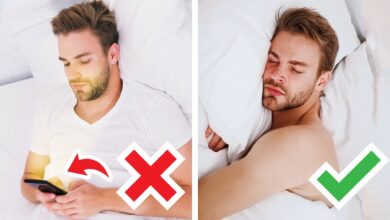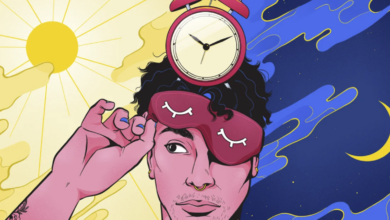
Do You Need More Sleep During the Winter?
Do you need more sleep during the winter? It’s a question many of us ask ourselves as the days grow shorter and the nights get longer. The change in seasons can significantly impact our sleep patterns, often leading to increased sleepiness and a desire for more shut-eye.
This natural phenomenon is driven by the body’s internal clock, or circadian rhythm, which is influenced by the amount of sunlight we receive. As daylight hours decrease, our bodies produce more melatonin, the sleep hormone, leading to feelings of drowsiness.
This shift in our sleep-wake cycle is a normal adaptation to the changing seasons, but it can sometimes lead to disruptions in our daily routines.
Understanding the science behind winter sleepiness can help us make informed choices about our sleep habits during this time of year. By adjusting our routines and incorporating healthy sleep practices, we can minimize the impact of seasonal changes on our sleep and maintain a sense of well-being.
Seasonal Changes and Sleep Needs
The transition from summer to winter brings about significant changes in our environment, including shorter days and reduced sunlight exposure. These changes can significantly impact our sleep patterns and overall well-being. Our bodies are naturally programmed to follow a circadian rhythm, a 24-hour cycle that regulates sleep-wake cycles, hormone production, and other bodily functions.
This internal clock is synchronized with the external environment, primarily through light exposure.
The Influence of Sunlight on Circadian Rhythm
During winter, the shorter days and reduced sunlight exposure disrupt our natural sleep-wake cycle. As the days get shorter, our bodies receive less sunlight, which signals to our brains to produce more melatonin, a hormone that promotes sleep. Melatonin production typically peaks in the evening, making us feel tired and prompting us to sleep.
Winter can definitely make you crave more sleep, and honestly, who can blame you? The shorter days and colder temperatures can make it hard to feel energized. If you’re feeling stressed about the extra sleep you might need, remember that stress itself can also disrupt your sleep.
So, maybe try checking out these 8 quick ways to reduce stress right now to help you get a good night’s rest and feel refreshed in the morning.
However, with less sunlight exposure during winter, melatonin production may be elevated for longer periods, potentially leading to increased sleepiness and difficulty waking up in the morning.
The Science Behind Winter Sleepiness
Winter’s chill often brings a wave of drowsiness, leaving us craving extra sleep. But why are we more tired during the colder months? It’s not just the cozy appeal of snuggling under blankets. There’s a fascinating interplay of physiological mechanisms that contribute to our increased sleepiness during winter.
Changes in Body Temperature and Hormone Levels, Do you need more sleep during the winter
Our body temperature naturally dips slightly during winter. This subtle decrease can impact our sleep-wake cycle, making us feel sleepier. The drop in temperature also triggers an increase in the production of melatonin, a hormone that regulates sleep. This surge in melatonin further contributes to the feeling of sleepiness during winter.
The Role of Adenosine in Winter Sleepiness
Research suggests a correlation between winter and increased levels of adenosine, a neurotransmitter that promotes sleepiness. Adenosine accumulates in the brain throughout the day, and its levels rise during periods of sleep deprivation. As we spend more time indoors during winter, we might experience less physical activity, which can lead to increased adenosine levels.
This, in turn, can make us feel more tired.
Reduced Sunlight Exposure and Its Impact on Mood and Energy Levels
Sunlight plays a crucial role in regulating our circadian rhythm, the natural sleep-wake cycle. During winter, reduced exposure to sunlight can disrupt this rhythm, leading to mood changes and lower energy levels. This is because sunlight stimulates the production of serotonin, a neurotransmitter associated with mood and energy.
The lack of sunlight can lead to a decrease in serotonin, contributing to feelings of fatigue and making us more likely to crave sleep.
We all know the winter blues can hit hard, and sometimes it feels like all you want to do is sleep. But did you know that your body might actually need more rest during the colder months? It’s fascinating to see how our bodies react to different seasons, and it reminds me of the incredible story I read about Charlotte who lost half her body weight on a vacation – you can read all about it here ! While I’m not advocating for drastic weight loss, it’s a great reminder that sometimes a change of scenery and a focus on self-care can lead to amazing results, even when it comes to our sleep patterns.
Practical Tips for Optimizing Winter Sleep

Winter’s shorter days and colder temperatures can wreak havoc on our sleep schedules. The reduced sunlight exposure and the body’s natural inclination towards hibernation can lead to feeling sluggish and groggy. But don’t fret! There are effective strategies you can employ to optimize your sleep during these darker months.
Establishing a Consistent Sleep Schedule
Maintaining a consistent sleep schedule is crucial for regulating your body’s natural sleep-wake cycle, known as the circadian rhythm. Even during winter, try to wake up and go to bed around the same time each day, including weekends. This helps signal your body when it’s time to sleep and wake up, promoting a more regular sleep pattern.
Winter’s shorter days and colder temperatures can definitely make you crave more sleep. But, if you’re also trying intermittent fasting, be sure to avoid common pitfalls! Check out this helpful article on 6 intermittent fasting mistakes to avoid to make sure you’re doing it right.
By avoiding these mistakes, you can ensure that your fasting routine complements your winter sleep needs and helps you feel your best all season long.
Creating a Relaxing Bedtime Routine
A relaxing bedtime routine signals your body that it’s time to wind down and prepare for sleep. Consider incorporating the following activities into your evening routine:
- Taking a Warm Bath or Shower: The warmth helps relax your muscles and soothe your mind, making it easier to drift off to sleep.
- Reading a Book: Engaging in a calming activity like reading can help quiet your mind and prepare you for sleep. Opt for books that are not too stimulating or suspenseful.
- Listening to Calming Music: Soothing music can help create a relaxing atmosphere and reduce stress. Choose calming genres like classical, ambient, or nature sounds.
- Practicing Mindfulness or Meditation: These techniques can help reduce stress and anxiety, promoting better sleep.
Maximizing Sunlight Exposure During Daylight Hours
Sunlight plays a crucial role in regulating your circadian rhythm. While winter days may be shorter, make the most of the daylight hours you have.
- Get Some Morning Sun: Expose yourself to natural sunlight as soon as you wake up. This helps reset your internal clock and promote wakefulness.
- Take Breaks Outdoors: Step outside during your lunch break or for short walks throughout the day. Even a few minutes of sunlight exposure can make a difference.
- Use a Light Therapy Box: If you live in a region with limited sunlight exposure, consider using a light therapy box. These devices emit bright light that mimics natural sunlight, helping to regulate your circadian rhythm.
The Impact of Winter Sleep on Health: Do You Need More Sleep During The Winter
Winter’s shorter days and colder temperatures can significantly impact our sleep patterns, often leading to insufficient sleep. While a cozy night in might sound appealing, neglecting your sleep during winter can have serious consequences for your health and well-being.
The Link Between Insufficient Sleep and Weakened Immunity
When we don’t get enough sleep, our immune system weakens, making us more susceptible to illnesses. Sleep deprivation can disrupt the production of essential immune cells, such as lymphocytes and natural killer cells, which are crucial for fighting off infections.
This weakened immune response can increase the risk of catching colds, flu, and other infections.
Sleep Deprivation and Mood Disturbances
Sleep deprivation is strongly linked to mood disorders like depression and anxiety. When we don’t get enough sleep, our brains have difficulty regulating emotions, leading to increased irritability, feelings of sadness, and difficulty concentrating. These mood disturbances can further impact our quality of life and overall well-being.
The Impact of Chronic Sleep Deprivation on Cognitive Function
Chronic sleep deprivation can have detrimental effects on cognitive function, memory, and overall well-being. When we consistently don’t get enough sleep, our brains struggle to form new memories, process information efficiently, and make sound judgments. This can lead to impaired decision-making, reduced productivity, and difficulty learning new skills.
The Benefits of Prioritizing Sleep During Winter
| Benefits | Description |
|---|---|
| Improved Mood | Adequate sleep helps regulate mood and reduces the risk of mood disturbances like depression and anxiety. |
| Enhanced Energy Levels | Getting enough sleep provides the body with the necessary rest and rejuvenation, leading to increased energy and alertness during the day. |
| Reduced Stress | Sleep deprivation can exacerbate stress levels. Prioritizing sleep helps manage stress and promotes a sense of calm and well-being. |
| Improved Cognitive Function | Sufficient sleep enhances cognitive function, memory, and concentration, improving overall productivity and decision-making abilities. |
| Strengthened Immune System | Adequate sleep boosts the immune system, making us less susceptible to infections and illnesses. |
Last Word
The winter months can be a time of cozy nights and hibernation, but it’s important to remember that getting enough sleep is crucial for maintaining our physical and mental health. By paying attention to our bodies’ natural sleep rhythms, adopting healthy sleep habits, and seeking professional help when needed, we can navigate the winter season with optimal sleep and well-being.
So, the next time you find yourself reaching for that extra blanket or snoozing your alarm, remember that it might be your body’s natural way of telling you to embrace the winter slumber and recharge for the days ahead.





